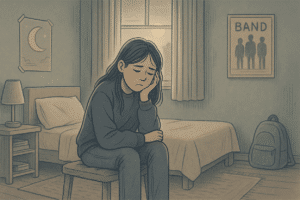School counselors play a vital role in supporting the mental health of students. As teens face a variety of challenges, from academic pressure to social issues, having a trusted person to talk to is essential. But how do school counselors help students manage mental health? In this article, we will explore the role of school counselors, the importance of mental health counseling in schools, and how counselors provide support to teens.
What is the Role of a Counselor in Mental Health?
A school counselor is a trained professional who helps students with their academic, social, and emotional needs. What is the role of a counselor in mental health? In schools, counselors help students cope with stress, anxiety, depression, and other mental health challenges. They provide a safe space for students to discuss their feelings and offer strategies for managing those feelings. School counselors also work closely with teachers and parents to ensure that each student receives the support they need.
How Do School Counselors Help Students Manage Mental Health?
How do school counselors help students manage mental health on a daily basis? They play several important roles in this process:
Providing Emotional Support
School counselors are often the first people students turn to when they feel overwhelmed. Whether a student is dealing with anxiety, sadness, or anger, the counselor listens and helps them process their emotions. By offering empathy and understanding, counselors make students feel heard and supported.
Helping with Stress Management
High school can be a stressful time for many students. Academic pressure, extracurricular activities, and social dynamics can all contribute to stress. School counselors teach students effective coping skills, such as relaxation techniques, time management, and problem-solving skills. These tools help students manage their stress more effectively.
Offering Crisis Intervention
Sometimes, students face serious mental health crises, such as suicidal thoughts, panic attacks, or trauma. In these cases, school counselors provide immediate support and intervene when necessary. They may refer the student to a mental health professional outside of school or work with the student and their family to develop a plan for ongoing support.
Teaching Social and Emotional Skills
School counselors often provide lessons or workshops on social and emotional learning (SEL). These programs teach students how to build healthy relationships, communicate effectively, and develop self-awareness. Learning these skills can improve students’ emotional well-being and help them navigate challenges more successfully.
Identifying Mental Health Issues Early
One of the most important roles of school counselors is identifying mental health issues early. When counselors notice changes in a student’s behavior, mood, or academic performance, they can step in and offer support. Early intervention can make a significant difference in a student’s long-term mental health outcomes.
Providing Referrals for Additional Support
Sometimes, a student may need more specialized help than a school counselor can provide. In these cases, counselors refer students to mental health professionals, such as therapists or psychiatrists. These referrals ensure that students receive the comprehensive care they need to address their mental health concerns.
Mental Health Counseling in Schools: Why It Matters?
Mental health counseling in schools is crucial because it provides students with the support they need in an environment where they spend most of their time. Schools are a primary setting for mental health interventions because they offer easy access to services. Without mental health counselors in schools, many students would struggle to find the resources they need.
Additionally, mental health counseling in schools helps reduce stigma around mental health. When students see that talking to a counselor is a normal and helpful thing to do, they are more likely to reach out for help. This normalization of mental health support can lead to better outcomes for students.
Mental Health Counselors in Schools: Bridging the Gap
Mental health counselors in schools serve as a bridge between students and the support they need. They work with teachers to identify students who may be struggling and create plans to address those students’ needs. School counselors also collaborate with families to ensure that support continues outside of school hours.
By working with both students and their wider support systems, mental health counselors help ensure that no student falls through the cracks. Their role in the school community is essential for creating an environment where students feel safe, supported, and empowered to seek help when they need it.
Addressing Common Mental Health Challenges in Teens
Teens today face a range of mental health challenges, including anxiety, depression, and stress. Here’s how school counselors address these issues:
Anxiety
Anxiety is one of the most common mental health issues among teens. School counselors help students recognize the signs of anxiety and develop coping strategies. This might include deep breathing exercises, mindfulness, or time management techniques to reduce stress.
Depression
School counselors are often the first to notice signs of depression in students, such as withdrawal from friends, a decline in academic performance, or changes in mood. By providing emotional support and connecting students with additional resources, counselors help teens manage their depression.
Bullying and Peer Pressure
Bullying and peer pressure can have a major impact on a student’s mental health. School counselors help students navigate these challenges by teaching conflict resolution skills, building self-esteem, and offering a safe space to talk about their experiences.
The Impact of School Counselors on Student Success
The presence of school counselors has a direct impact on student success. When students have access to mental health support, they are more likely to succeed academically and socially. Mental health counseling in schools helps students stay focused on their education, manage their emotions, and build healthy relationships.
Additionally, school counselors play a key role in reducing absenteeism. When mental health issues are addressed, students are more likely to attend school regularly and participate in class. By providing mental health support, school counselors help create an environment where all students can thrive.
Conclusion
How do school counselors help students manage mental health? They provide emotional support, teach coping strategies, intervene in crises, and offer guidance for navigating social and academic challenges. Their role in the school community is essential for helping students manage their mental health and succeed in all areas of life.
If you or someone you know is in need of support, visit Mission Prep for more resources on teen mental health.






















